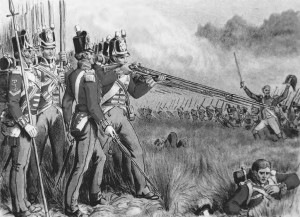Fantasy has taken many forms over the years, often using a medieval pseudo-European setting as the backdrop. Usually technology or society in such a fantasy setting will rarely resemble or draw inspiration from anything after the 14th century. And unless the genre is Urban Fantasy, firearms rarely if ever crop up in a fantasy story. Promise of Blood is a very different sort of fantasy, departing from such conventional restrictions. Written by Brian McClellan and published by Orbit, it is Part One of The Powder Mage Trilogy.

Promise of Blood opens with a violent military coup. Field Marshall Tamas, a powerful powder mage and the hero of the Kingdom of Adros, has exterminated the Royal Cabal of mages in service to the king, with the royal family soon to follow. Declaring the monarchy and the nobility to be corrupt and working against the nation and its people, Tamas works to tear down the old regime so that a new, more democratic rule can take its place. In the midst of a civil war and an imminent invasion by a neighbouring brutal and expansionist empire, Inspector Adamat is ordered by Tamas to investigate the last words uttered by every member of the Royal Cabal: “You can’t break Kresimir’s Promise.” What ensues is a fast-paced and exciting tale of intrigues, revolution, and a clash between the powers of the old era and those of the new.
Among the more traditional forms of magic practised in his setting, McClellan introduces a novel idea: mages who draw their power from gunpowder, i.e. “powder mages.” While the traditional mages, not so subtly referred as the Privileged, are more powerful, they are also rarer and take longer to train than a powder mage. In addition, while a Privileged can call down firestorms and shatter stone with bare hands, a powder mage can, among other abilities, fire a bullet farther and with greater accuracy — before a Privileged realizes they are under attack. Powder mages are a relatively new phenomenon within the context of the setting, and like gunpowder in real history, emblematic of shifting power dynamics between the old and the new. This is apparent with the novel’s opening.

As has been stated above, Promise of Blood, and The Powder Mage Trilogy as a whole, are a very different sort of fantasy story. There are no orcs, elves, dwarves, or any such counterparts. Magic is treated as a part of the ruling governance or military, with little actual mystique. There is no “Dark Lord” whose shadow looms over the world, and civilization is very reminiscent of 16th or 17th century Europe. While there are a few elements of traditional fantasy, such as the sort of ancient prophecy as could be found in the works of Dennis L. McKiernan, McClellan’s book very much focuses on the human element. That is perhaps the greatest strength of the novel: its human characters.
From the bold and vindictive Field Marshall Tamas, to the skilled but humble Inspector Adamat, to Tamas’ own son Taniel, struggling with a father who is also his general, all feel like real people whose troubles the average reader understands and empathizes. And again it is the human element that drives the story. The plot is very much driven by human wants, emotions, and desires. Tamas’ motivations are equal parts justice for his nation and vengeance for his beloved wife. There may even be moments where the reader questions the rightness of Tamas’ actions and that of other characters.
The only real shortcoming to Promise of Blood is how abruptly and without warning it can sometimes change focus from one character to another. But with the combination of excellent writing and world-building, Brian McClellan’s Promise of Blood is sure to be an enjoyable read for those who like good characters, intrigue, and frantic battles of guns and sorcery.
Xlibris Publishing trusts this helps
Please make sure to check out the Xlibris Publishing site for more advice and blogs, and be sure to follow us on Xlibris Publishing Facebook and Xlibris Publishing Twitter. Get your free publishing guide here.
By Ian Smith

